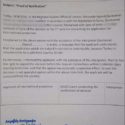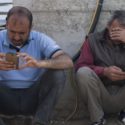Tag: Greece
-
Justice for the Moria 6!
On 8 September 2020, the infamous Moria refugee camp in Lesvos, Greece burned to the ground, throwing fortress Europe’s policies of deterrence through immiserating conditions, border externalisation and ‘containment’ on the Aegean ‘hotspot’ islands back into the international spotlight. The fires came a week after a resident of the camp tested positive for COVID-19 and…
-
PIXI: “THE OLIVE TREE AND THE OLD WOMAN”
This story is written by Parwana Amiri, a young Afghan woman who has lived with her family in the Olive Grove from the Moria hotspot since September 2019. When Parwana noticed how unbearable the living conditions were, she supported the people with her language skills and started to publicize the stories they had experienced.Her “LETTERS TO…
-
Pazarkule: Bir ayın sonunda / After a month
Once drawn to the Turkey-Greece border, migrants are trapped by the police force, with hunger and miserable conditions, and pushed back several times.
-
39 months City Plaza: the end of an era, the beginning of a new one
On 10th July 2019 the keys of squatted City Plaza were handed back to the former employees of the hotel, to whom the mobile equipment in the building belongs. All refugees living at City Plaza have been moved to safe housing within the city.
-
Greece: Hunger Strike in Elliniko Camp in Athens
Infomobile Information with, about and for refugees in Greece On 5th February 2017, most of the adults among the 711 refugees residing in a state-run Camp in the former Athens National Airport (Camp Elliniko II), in the majority coming from Afghanistan, started a hunger strike to protest against their degrading living conditions demanding for their…
-
w2eu Statement 22.01.2017: No Dublin Returns to Greece!
‘One step forward, hundreds back…’ seems to be the motto under which EU experts implement refugee policy, as currently also demonstrated in Greece. On 8 December 2015, the European Commission published its fourth recommendation on the resumption of Dublin Returns to Greece, this time stating that they could be gradually re-installed, as according to them,…
-

European Borders update 15.4.2016. Greece starts rejecting people as Turkey labeled ‘safe third country’
TURKEY: Up to 30.000 refugees started heading to Turkey during the last 48 hours, Spiegel Online reports based on the information provided by the volunteers. This follows several attacks by IS at refugee camps in Northern Syria. However, Turkey refuses to let them to cross the border. As already known, Turkey is building a 911km…
-

Idomeni Petition: Stop killing us slowly with Skype asylum applications
PLEASE SIGN THE PETITION This is a petition made by the people in Idomeni camp. They are forced by Greece government to apply for asylum through a skype call. They have to call a skype number, which is never available. they write: n Idomeni camp, living in tents in the mud, rain and sun…
-
Demo 15.04. // Stop deportations – There is enough space for everyone! // Alexanderplatz
*Arabic ** English below *** Francais en bas Stop deportations – There is enough space for everyone! Aufruf zur Demo am Freitag den 15.04.2016 um 16Uhr am Alexanderplatz gegen die Abschiebungen in die Türkei und für die Aufnahme von Geflüchteten. Seit Montag werden Flüchtende von Griechenland in die Türkei abgeschoben. In die Türkei, in der gerade…